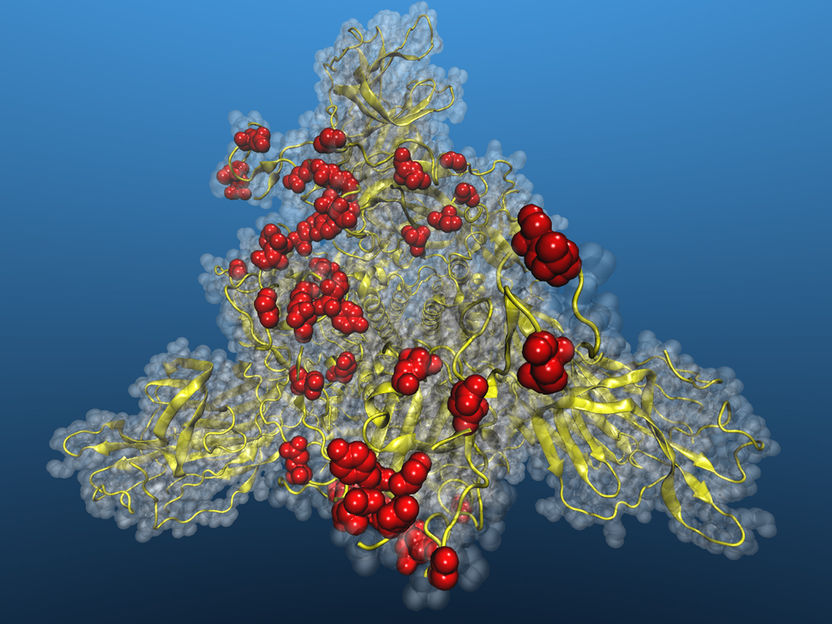Evidence: Boost immunizations help against Omicron
Worldwide study on efficacy of cross-vaccinations
A new study of the ATAC consortium (Antibody Therapy Against Corona) with participation of Technische Universität Braunschweig shows that boost immunization increases the number of antibodies against the envelope protein of SARS-CoV-2. This increase could be measured in all virus variants studied including the new Omicron variant. In addition, the number of specific B and T cells was increased after boost immunization. A major observation was the good effect of mRNA boost immunization also after a double vaccination with the inactivated virus vaccines of Sinovac or Sinopharm that were used to immunize a large fraction of the world’s population.

Structural model of the spike protein of SARS-CoV-2. The positions where the omicron variant shows changes are marked in red. The structural model is based on PDB file 6LZG.
Stefan Dübel/TU Braunschweig
Different vaccines against SARS-CoV-2 are used worldwide. In Europe, the vector vaccines from AstraZeneca and Johnson&Johnson, the mRNA vaccines from BioNTech and Moderna, and recently the envelope protein vaccine from Novovax are approved. In other parts of the world, particularly Asia and South America, vaccines based on inactivated original virus particles (“inactivated vaccine”) are very commonly used (e.g. from Sinovac and Sinopharm). These vaccines account for 41 percent of applied vaccine doses worldwide. Unfortunately, these two vaccines have low effectiveness against the Delta variant. Effectiveness in preventing SARS-CoV-2 infection decreases over time for all available vaccines, as, to a lesser extent, protection against severe progression of COVID-19 disease. Therefore, boost immunizations are necessary to maintain effective protection against SARS-CoV-2 over time.
In the new ATAC consortium study (preprint), serum samples from COVID-19 convalescents and people immunized with mRNA vaccines (BioNTech, Moderna) or inactivated vaccines (Sinovac, Sinopharm) were examined. It was shown that the amount of antibodies in the blood against the envelope protein of SARS-CoV-2 started to decrease about three months after the second vaccination. However, boost immunization again increased the amount of specific antibodies, even to higher levels than immediately after the second vaccination. This could be shown for all four virus variants of concern (VOC): the original Wuhan variant, as well as Beta, Delta and Omicron. For the Wuhan variant, the number of immune cells (B and T lymphocytes) reacting against the virus was also determined. Here again, boost immunization resulted in an impressively improved immune response.
The highest antibody levels were found in triple mRNA vaccinated and – most important – also in those vaccinated first with an “inactivated vaccine” and then boosted with an mRNA vaccine. Although the benefit of such cross-vaccination has already been shown in other publications, this was only demonstrated so far for vector vaccines and mRNA vaccines licensed in the EU and the USA. The new data are therefore particularly important for those regions of the world where the first two vaccinations were done with an “inactivated vaccine”. They suggest that cross-vaccination with an mRNA vaccine can increase protection here.
Dr. Maren Schubert is pleased that she was able to support the study with a technology she developed: “My new method for the production of proteins in insect cells not only helped to develop therapeutic antibodies against SARS-CoV-2, but also to very quickly assess the immune response of COVID-19 patients and vaccinated individuals.”
Professor Michael Hust, head of the ATAC team in Braunschweig, said, “It is important to study not only vaccines licensed in the Western world, but also those used in other regions of the world to assess vaccine efficacy worldwide.”
Dr. Federico Bertoglio, postdoctoral fellow in the ATAC project, said, “Our work shows, how successfully we are working here in Braunschweig with international partners to combat the pandemic through therapeutic antibodies as well as through our analysis of immune responses in a COVID-19 disease and SARS-CoV-2 vaccines.”
“Omicron is another warning to all of us that we cannot end the pandemic locally, but only by vaccinating the entire global population in the best way possible. Fortunately for mankind, biotechnology has been able to provide numerous vaccines and medicines worldwide in a shorter time than ever before in the history of medicine. Making these powerful medications available to all people as quickly as possible must be the goal of all of us.” says Professor Stefan Dübel, head of the Department of Biotechnology at TU Braunschweig.
The current preliminary study builds on previous findings of the TU team on the binding of human sera to Omicron and the article “Immunity to SARS-CoV-2 up to 15 months after infection” just published in iScience.



















































